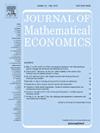From local utility to neural networks
IF 0.7
4区 经济学
Q3 ECONOMICS
引用次数: 0
Abstract
We introduce and analyze two preference-based notions of local linearity in the spirit of Machina (1982). We show how the weaker among the two extends Machina’s local utility analysis, and that the stronger among the two characterizes continuous finite piecewise linear (CFPL) utility functions. We introduce a representation of the decision maker’s preference called the neural-network utility representation that is equivalent to the CFPL representation, in which the decision maker evaluates an alternative through a neural network.
从局部效用到神经网络
我们根据 Machina(1982 年)的精神,引入并分析了两个基于偏好的局部线性概念。我们展示了这两个概念中较弱的一个是如何扩展马奇纳的局部效用分析的,而较强的一个则是连续有限片断线性(CFPL)效用函数的特征。我们引入了一种决策者偏好的表征,称为神经网络效用表征,它等同于 CFPL 表征,其中决策者通过神经网络对备选方案进行评估。
本文章由计算机程序翻译,如有差异,请以英文原文为准。
求助全文
约1分钟内获得全文
求助全文
来源期刊

Journal of Mathematical Economics
管理科学-数学跨学科应用
CiteScore
1.70
自引率
7.70%
发文量
73
审稿时长
12.5 weeks
期刊介绍:
The primary objective of the Journal is to provide a forum for work in economic theory which expresses economic ideas using formal mathematical reasoning. For work to add to this primary objective, it is not sufficient that the mathematical reasoning be new and correct. The work must have real economic content. The economic ideas must be interesting and important. These ideas may pertain to any field of economics or any school of economic thought.
 求助内容:
求助内容: 应助结果提醒方式:
应助结果提醒方式:


